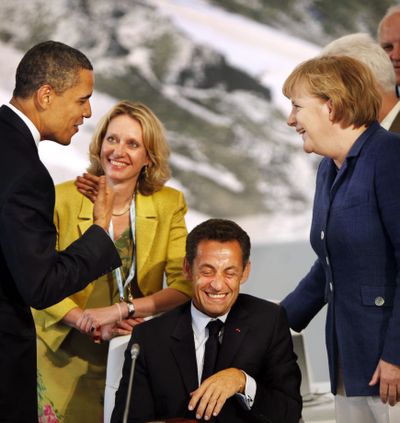G-8 leaders pledge emissions cuts
Goal is global temperature rise of no more than 3.6 degrees

L’AQUILA, Italy – Targeting global warming, President Barack Obama and other leaders of the world’s richest industrial countries pledged Wednesday to seek dramatic cuts in greenhouse gas emissions by 2050 to slow dangerous climate change. Setting a marker for success, they agreed for the first time that worldwide temperatures must not rise more than a few degrees.
However, their goals are nonbinding, and it’s far from clear they will be met. The wealthy nations failed to persuade the leaders of big developing countries to promise to cut their own fast-spreading pollution, unable to overcome arguments that the well-established industrial giants aren’t doing enough in the short term.
Obama and his counterparts from the other wealthy Group of Eight nations agreed that global temperatures should be kept from rising by more than 2 degrees Celsius, or 3.6 degrees Fahrenheit in the fight against human-caused weather changes.
The results left some Western leaders cheering. British Prime Minister Gordon Brown called the group’s statement a “historic agreement.” German Chancellor Angela Merkel said it was “a clear step forward.”
Environmental groups said the effort fell far short in its bid to cut carbon emissions that come mainly from energy production and that trap heat in the atmosphere. Still, climate change experts said the measure on trying to limit temperature increases – with agreement by both the G-8 and a 17-member group of industrialized and developing nations meeting here this week – was an important step.
An increase up to the limit the leaders set wouldn’t eliminate the risk of runaway climate change but would reduce it, experts said. Even a slight increase in average temperatures could wreak havoc on farmers around the globe as seasons shift, crops fail, and storms and droughts ravage fields.
“After a long struggle, all of the G-8 nations have finally accepted the 2-degree goal,” said Merkel.
The United States and other G-8 nations set a goal of reducing their greenhouse gas emissions by 80 percent or more by 2050. That’s part of a plan to have all such gases, from rich and poor nations alike, fall by 50 percent globally by that year.
But developing countries feel the better-established nations aren’t doing enough in the shorter term. They also worry that major reduction commitments on their parts, even if below the 80 percent target of rich nations, would hamper economic growth in China, India, Mexico, Brazil and many other non-G-8 countries.